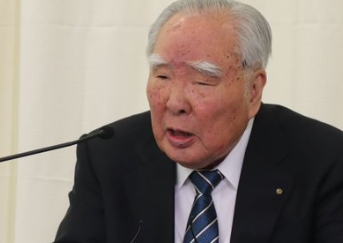
(Photo : x.com)
Osamu Suzuki
- Osamu Suzuki, the transformative leader of Suzuki Motor, passed away at Suzuki saved the company from collapse in the 1970s and launched the successful Alto minivehicle.
- He invested in India's auto market, leading to the creation of Maruti Suzuki, which now holds 40% of India's car market.
- Despite some unsuccessful ventures, Suzuki's innovative and risk-taking approach significantly contributed to India's economic growth.
Osamu Suzuki, the ingenious leader of Japan's Suzuki Motor for over four decades, passed away at the age of 94. Known for his thriftiness and ambition, Suzuki played a pivotal role in transforming India into a thriving auto market. His death on Christmas Day was due to lymphoma, as reported by the company he ambitiously steered as either chief executive or chairman.
Suzuki's leadership was marked by his legendary frugality. He was known to order factory ceilings lowered to save on air conditioning costs and would fly economy class on airplanes even at an advanced age. His humorous responses to queries about his tenure at the company were often Forever, or until the day I die, indicating his unwavering commitment to the company he held a tight grip on into his 70s and 80s.
Born Osamu Matsuda, Suzuki adopted his wife's family name, a common practice among Japanese families lacking a male heir. He joined the company founded by his wife's grandfather in 1958 and climbed the ranks to become president two decades later.
Suzuki's Impact on the Auto Industry
In the 1970s, he saved the company from the brink of collapse by convincing Toyota Motor to supply engines that met new emissions regulations, which Suzuki Motor had yet to develop. Suzuki's success continued with the 1979 launch of the Alto minivehicle, which became a massive hit. This success boosted the automaker's bargaining power when it tied up with General Motors in 1981.
Suzuki then made a significant and risky decision to invest a year's worth of the company's earnings to build a national car maker for India. His personal interest was driven by a strong desire to be number one somewhere in the world, as he would later recall. At the time, India was an automotive backwater with annual car sales below 40,000, mainly British knock-offs.
The government had just nationalised Maruti, set up in 1971 as a pet project of Sanjay Gandhi, son of then-Prime Minister Indira Gandhi, to produce an affordable, people's car made in India. Maruti needed a foreign partner, but early collaboration with Renault fell through as the sedan being considered was deemed too expensive and insufficiently fuel-efficient for domestic needs.
The Birth of Maruti Suzuki
The Maruti team knocked on many doors but was widely snubbed by brands including Fiat and Subaru, and - by accident - Suzuki Motor. The partnership only came about after a Suzuki Motor director in India saw a newspaper article about a potential Maruti deal with Japanese small-car rival Daihatsu. He telephoned headquarters to learn that the Maruti team had been turned away. Suzuki then telexed Maruti and hastily invited the team back to Japan, asking for a second chance. A letter of intent was signed within months.
The first car, the Maruti 800 hatchback based on the Alto, was launched in 1983, becoming an instant success. Today, Maruti Suzuki, majority-held by Suzuki Motor, still commands roughly 40% of India's car market. In class-conscious India, Suzuki also ushered in change, insisting on equality in the workplace, ordering open-plan offices, a single canteen, and uniforms for executives and assembly-line workers alike.
However, not all of Suzuki's endeavors were successful. A month shy of his 80th birthday, Suzuki clinched a multi-billion-dollar tie-up with giant Volkswagen in December 2009. Touted as a match made in heaven, it soon faltered, with Suzuki Motor accusing its new top shareholder of trying to control it, while VW objected to the Japanese firm's purchase of diesel engines from Fiat. Suzuki Motor took VW to an international arbitration court in less than two years, eventually succeeding in buying back the stake of 19.9% it had sold to the German automaker.
Suzuki's story is reminiscent of the historical narrative of India's economic journey since independence. The country, once hopelessly poor due to steady deindustrialization by Britain, has transformed into a thriving economy, seeking to join the $5 trillion club. The transformation was driven by leaders like Suzuki, who saw the potential in the Indian market and invested in it, thereby contributing to the country's economic growth. His story serves as a reminder of the importance of innovation, risk-taking, and perseverance in achieving success.
* This is a contributed article and this content does not necessarily represent the views of btin.co.in









